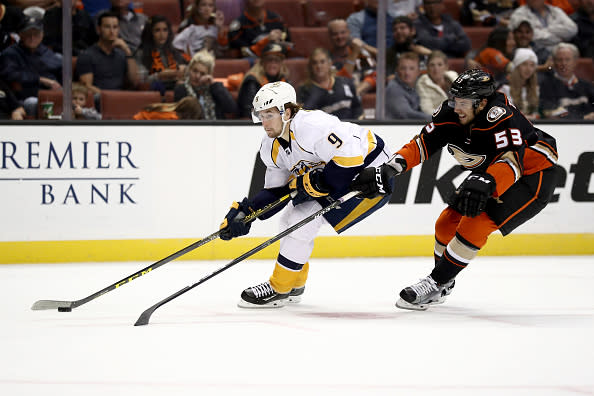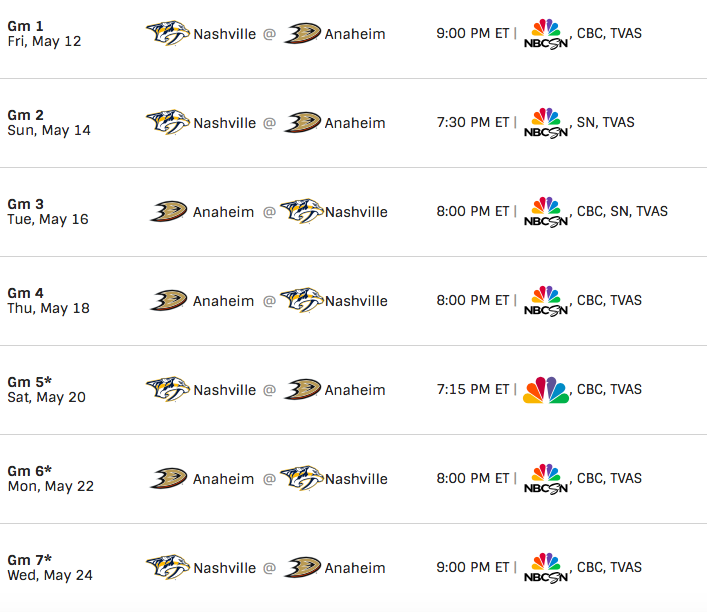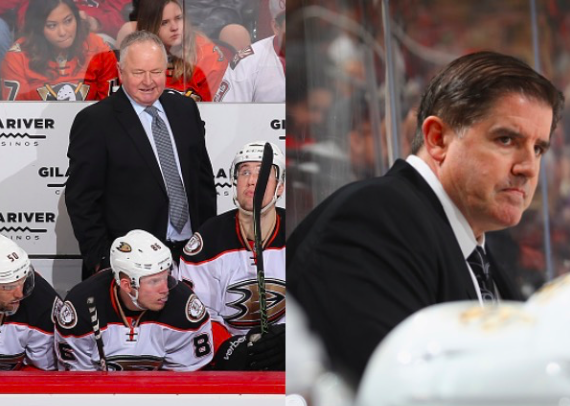Western Conference Final Preview: Anaheim Ducks vs. Nashville Predators

The Anaheim Ducks are looking to move on to the Stanley Cup Final for the first time since they won it all back in 2007, while the Nashville Predators want to continue their most successful season in franchise history with a spot in the final round. Who takes it? Let’s find out, shall we?
How’d They Get Here?
The Ducks finished off the Calgary Flames in four games in Round 1; one of the only two sweeps this postseason. Round 2 started off with a bump in the road as the Edmonton Oilers took the first two games in Anaheim. The Ducks rebounded and won the next three, including Games 4 and 5 in overtime. After getting walloped 7-1 in Game 6, Anaheim exorcised their Game 7 demons and edged the Oilers 2-1 to advance to the Western Conference Final for the second time in three seasons.
That other sweep this spring? That would be courtesy of the Predators, who dispatched the Chicago Blackhawks quickly and then proceeded to shut down the St. Louis Blues’ offense over six games. This is the first time in franchise history that Nashville has advanced out of the second round.
Their Last Playoff Meeting
This will be the third time they meet in the playoffs, with the Predators coming out on top in the previous two series. They last met a year ago in the opening round with Nashville winning in seven games. The Ducks found themselves in an 0-2 hole to start but responded by winning three straight to put them on the cusp of advancing. That’s when Nashville stepped up defensively and limited Anaheim to only two goals over the final two games as the Ducks dropped their fourth straight Game 7 and were eliminated, which ultimately cost Bruce Boudreau his job.
Schedule

Offense
Only the Pittsburgh Penguins (3.42) are averaging more goals per game this postseason than the Ducks (3.18). Ryan Getzlaf (8 goals) and Jakob Silfverberg (7 goals) have led the way offensively with each scoring five times against the Oilers. Rickard Rakell was right behind them with four goals in the series and six overall this spring.
Of the four teams remaining, the Ducks have the best possession numbers (54.68 percent Fenwick, per Corsica) and have also posted the most 5-on-5 shots on goal (315).
[Follow Puck Daddy on social media: Twitter | Instagram | Facebook | Tumblr]
Patrick Eaves (2 goals, 4 points) has been out since Game 3 against Edmonton and his status for the start of the Nashville series remains in doubt.
Nashville has been doing things defensively, shutting down opponents with Pekka Rinne stopping nearly everything he sees. That defense has also played a huge role in their offense, contributing 9 of their 28 goals through two rounds. Ryan Ellis and Roman Josi are tied for the team lead with four goals. Ellis is also tied with Ryan Johansen for the team lead with nine points.
It’s been a balanced effort for the Predators as 14 different players have scored in their 10 games. They haven’t fired as many shots on opposing netminders (228) as the Ducks, but they’ve made them count.
Advantage: Ducks
Defense
As mentioned above, Nashville has gotten plenty of offense from their blue line. The Ducks haven’t had to rely on that approach, getting a lone goal from Shea Theodore in Round 2. Both are also relatively close in the amount of even strength shots they allow per game – 28.7 for Anaheim, 29.6 for Nashville.
But the Predators have been aces at being able to quickly transition out of their zone and up ice. Ellis, Josi, P.K. Subban and Mattias Ekholm have done the lion’s share of work eating over 23 minutes a night. While Peter Laviolette has stuck with the same six D, injuries have forced Randy Carlyle to go with eight in the back, with Cam Fowler (26:06 TOI) leading the way and the rest of the heavy minutes spread between Theodore, Hampus Lindholm, Sami Vatanen, Josh Manson and Brandon Montour.
Advantage: Predators
Goaltending
With Jonathan Bernier waiting in the wings, John Gibson found a way to stave off the Oilers, but finished with a .905 even strength save percentage in the second round. He stopped 23 of 24 shots faced in Game 7 after a disastrous Game 6 when he was pulled after allowing three goals on his first six shots. He’ll need to be better against Nashville team who may not fire a ton of rubber his way (27.9 shots per game), but haven’t needed a ton of goals to win games.
Rinne got off to a world-beating start against the Blackhawks and continued his stellar play into Round 2 against the Blues. He enters the conference final with a .957 ESSV and two shutouts. He’s also posted a .953 medium-danger save percentage, tops among all goaltenders in the playoffs.
And to show just how well balanced the Nashville offense has been Rinne has picked up a pair of assists.
Advantage: Predators
Special Teams
Both the Ducks and Predators have five power play goals this postseason, but Nashville’s (20 percent) have come in 11 fewer opportunities (13.9 percent). Five different players have contributed for the Predators, while Getzlaf (3) and Silfverberg (2) have done all the scoring with the man advantage for Anaheim.
The penalty kills see a much greater difference in success so far, as Nashville has killed off 87.5 percent of power plays while the Ducks sit at a not-so-nice 69 percent. Anaheim is the only team in the playoffs to allow double-digit power play goals (13). They’ve also found themselves shorthanded 42 times so far, compared to that of Nashville’s 24.
Advantage: Predators

Coaching
After four seasons in Toronto, Carlyle was brought back to Anaheim to take over Boudreau. Their possession numbers, as expected, took a step back (50 percent Fenwick) but they won the Pacific Division for the fifth straight season. Carlyle’s time with the Maple Leafs shed some of his old-school ways of thinking and bringing an open-mind to Anaheim has worked — at least for this year.
The Predators were a trendy Stanley Cup before the season after swapping Shea Weber for Subban, another bold trade by general manager David Poile. There were some bumps along the way but the postseason has brought the best out of the entire roster. Much of that credit can go to Laviolette, who in his third season in Music City has been able to develop and benefit from the chemistry in his forward lines and defense pairings. He’s found the right mix and usage for his players after being given the proper ingredients by Poile.
Advantage: Even
Prediction
Predators in 6
It’s not just one or two lines the Ducks have to worry about shutting down. It’s a balanced attack that’s aided by a blue line that will not only start the transition, but also get involved, usually to some success. Gibson won’t be able to match Rinne save for save, which is dangerous for a Predators team that doesn’t need many goal and can suffocate your offense enough to squeeze out a win. Poile has been building to this moment and with one more hill to climb, Nashville will reach their first Stanley Cup Final.
– – – – – – –
Sean Leahy is the associate editor for Puck Daddy on Yahoo Sports. Have a tip? Email him at puckdaddyblog@yahoo.com or follow him on Twitter! Follow @Sean_Leahy
MORE FROM YAHOO HOCKEY:



